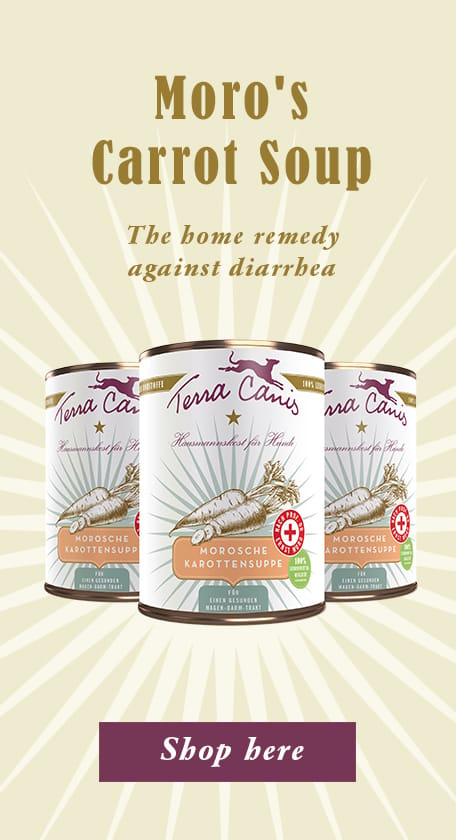
Vet-Lexicon
Diarrhoea in dogs: causes, treatment and nutritional advice

Diarrhoea is a common problem in dogs and can be worrying for owners and animals. It is important to know that diarrhoea is a symptom in itself and is not a disease in its own right. We refer to diarrhoea when the dog’s stool consistency is softer, it defecates more often and/or there is anything else in the faeces, for example blood or mucus.
A distinction is made between different types of diarrhoea based on the length of the symptoms and the part of the intestine affected. Acute diarrhoea usually lasts a few days, while chronic diarrhoea lasts at least 3 weeks. The frequency and quantity of faeces, anything in the faeces and possible weight loss help determine whether the small or large intestine is affected, or possibly both.
| Symptoms | Small intestine diarrhoea | Large intestine diarrhoea |
|---|---|---|
| Weight loss | frequently | rarely |
| Faeces volume | more | less |
| Defecation frequency | normal 2-3 times a day | frequent >3 times a day |
| Blood/mucus in faeces | unusual | sometimes |
Causes of acute diarrhoea in dogs
Acute diarrhoea is usually a short-term event and can be caused, for example, by an abrupt change in food, eating inappropriate substances such as spoiled food or rubbish, or by a parasitic infestation. Most acute diarrhoea is uncomplicated and self-limiting, i.e. it clears up on its own after a few days. If there is a parasitic infestation, you should of course treat this. If the affected dog displays severe acute symptoms such as bloody diarrhoea, exhaustion, reduced appetite, weakness or similar, you should definitely consult a vet.
Causes of chronic diarrhoea in dogs
Chronic diarrhoea is when the symptoms persist for at least 3 weeks. In this case, a diagnostic work-up by a vet is highly recommended. The cause should be investigated by means of a faecal examination, blood test and ultrasound of the abdomen in order to be able to start targeted treatment.
Chronic diarrhoea can be caused by the gastrointestinal tract itself, e.g. food allergies, chronic inflammatory diseases such as inflammatory bowel disease (IBD) or tumours. Diseases outside the gastrointestinal tract can also lead to chronic diarrhoea, such as kidney or liver disease, hormonal disorders or pancreatic diseases.
Treating diarrhoea
The treatment of diarrhoea depends on the underlying cause, the length and severity of the symptoms, which is why there is no general treatment plan for dogs with diarrhoea. Treatment should always be decided on an individual basis.
Since the cause of acute gastrointestinal problems can often not be determined, the symptoms are usually treated in straightforward cases, i.e. light pain medication can be used if necessary in consultation with the attending vet and the gastrointestinal tract can also be relieved with a light diet. Our First Aid light food and Professor Moro’s carrot soup are ideal for this: Light dog food for gastrointestinal problems from Terra Canis
In the case of chronic gastrointestinal diseases, the focus is often on treating the underlying disease, with the right food always being an important part of the treatment as a targeted supplement. Unfortunately, there is no “one-size-fits-all” solution for feeding dogs with chronic diarrhoea. Approximately 70% of dogs with chronic gastrointestinal symptoms have what is known as a food-responsive disease, which means that the symptoms improve when fed a hypoallergenic diet, comparable to a food allergy. For this reason, a hypoallergenic diet is particularly recommended for dogs with chronic inflammatory bowel disease (IBD). Hypoallergenic means that the diet is (initially) deliberately simple, avoiding the classic main allergens such as chicken, beef, dairy products, soya and egg and feeding a protein and carbohydrate source unknown to the dog (see also: Exclusion diet for dogs | Vet-Lexicon from Terra Canis). If the chronic gastrointestinal problem is not food-responsive, a highly digestible special diet can provide the best possible relief for the gastrointestinal tract. Our Intestinal line is ideal for this: AliVet Intestinal – dog food for gastrointestinal sensitivity. In addition to the right food, supportive supplements such as prebiotics and probiotics are often used to promote good bacteria in the intestinal flora (known as the microbiome) in cases of chronic diarrhoea.
In summary, diarrhoea in dogs is a symptom that can appear in many different forms. Early and correct diagnosis as well as an adapted diet and treatment can help dogs get back on their paws quickly. However, a vet should always be consulted, especially if the symptoms persist.
In summary, diarrhoea in dogs is a symptom that can appear in many different forms. Early and correct diagnosis as well as an adapted diet and treatment can help dogs get back on their paws quickly. However, a vet should always be consulted, especially if the symptoms persist.
Author
Dr Martin Bucksch is a veterinarian and author. Since 2011, he has supported Terra Canis as a consultant, product developer and medical advisor. Dr Bucksch completed his studies in veterinary medicine with distinction in Italy in 1992. He then trained as a specialised vet in Germany and the Netherlands, as a veterinary dermatologist in Hamburg, Luxembourg, Vienna and the USA, and has completed various training courses in the field of the nutrition of small animals. His specialisations are dermatology and the diets of animals with intolerances and allergies.





